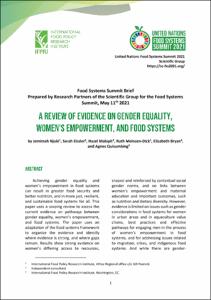Njuki, Jemimah; Eissler, Sarah; Malapit, Hazel; Meinzen-Dick, Ruth; Bryan, Elizabeth; Quisumbing, Agnes: A review of evidence on gender equality, women’s empowerment, and food systems : Food Systems Summit Brief Prepared by Research Partners of the Scientific Group for the Food Systems Summit, May 11th 2021.
Online-Ausgabe in bonndoc: https://doi.org/10.48565/scfss2021-1q69
Online-Ausgabe in bonndoc: https://doi.org/10.48565/scfss2021-1q69
@article{handle:20.500.11811/9132,
doi: https://doi.org/10.48565/scfss2021-1q69 ,
author = {{Jemimah Njuki} and {Sarah Eissler} and {Hazel Malapit} and {Ruth Meinzen-Dick} and {Elizabeth Bryan} and {Agnes Quisumbing}},
title = {A review of evidence on gender equality, women’s empowerment, and food systems : Food Systems Summit Brief Prepared by Research Partners of the Scientific Group for the Food Systems Summit, May 11th 2021},
publisher = {Center for Development Research (ZEF) in cooperation with the Scientific Group for the UN Food System Summit 2021},
year = 2021,
month = may,
note = {Achieving gender equality and women’s empowerment in food systems can result in greater food security and better nutrition, and in more just, resilient, and sustainable food systems for all. This paper uses a scoping review to assess the current evidence on pathways between gender equality, women’s empowerment, and food systems. The paper uses an adaptation of the food systems framework to organize the evidence and identify where evidence is strong, and where gaps remain. Results show strong evidence on women’s differing access to resources, shaped and reinforced by contextual social gender norms, and on links between women’s empowerment and maternal education and important outcomes, such as nutrition and dietary diversity. However, evidence is limited on issues such as gender considerations in food systems for women in urban areas and in aquaculture value chains, best practices, and effective pathways for engaging men in the process of women’s empowerment in food systems, and for addressing issues related to migration, crises, and indigenous food systems. And while there are gender-informed evaluation studies that examine the effectiveness of gender- and nutrition-sensitive agricultural programs, evidence to indicate the long-term sustainability of such impacts remains limited. The paper recommends keys areas for investment: improving women’s leadership and decision-making in food systems, promoting equal and positive gender norms, improving access to resources, and building cross-contextual research evidence on gender and food systems.},
url = {https://hdl.handle.net/20.500.11811/9132}
}
doi: https://doi.org/
author = {{Jemimah Njuki} and {Sarah Eissler} and {Hazel Malapit} and {Ruth Meinzen-Dick} and {Elizabeth Bryan} and {Agnes Quisumbing}},
title = {A review of evidence on gender equality, women’s empowerment, and food systems : Food Systems Summit Brief Prepared by Research Partners of the Scientific Group for the Food Systems Summit, May 11th 2021},
publisher = {Center for Development Research (ZEF) in cooperation with the Scientific Group for the UN Food System Summit 2021},
year = 2021,
month = may,
note = {Achieving gender equality and women’s empowerment in food systems can result in greater food security and better nutrition, and in more just, resilient, and sustainable food systems for all. This paper uses a scoping review to assess the current evidence on pathways between gender equality, women’s empowerment, and food systems. The paper uses an adaptation of the food systems framework to organize the evidence and identify where evidence is strong, and where gaps remain. Results show strong evidence on women’s differing access to resources, shaped and reinforced by contextual social gender norms, and on links between women’s empowerment and maternal education and important outcomes, such as nutrition and dietary diversity. However, evidence is limited on issues such as gender considerations in food systems for women in urban areas and in aquaculture value chains, best practices, and effective pathways for engaging men in the process of women’s empowerment in food systems, and for addressing issues related to migration, crises, and indigenous food systems. And while there are gender-informed evaluation studies that examine the effectiveness of gender- and nutrition-sensitive agricultural programs, evidence to indicate the long-term sustainability of such impacts remains limited. The paper recommends keys areas for investment: improving women’s leadership and decision-making in food systems, promoting equal and positive gender norms, improving access to resources, and building cross-contextual research evidence on gender and food systems.},
url = {https://hdl.handle.net/20.500.11811/9132}
}






